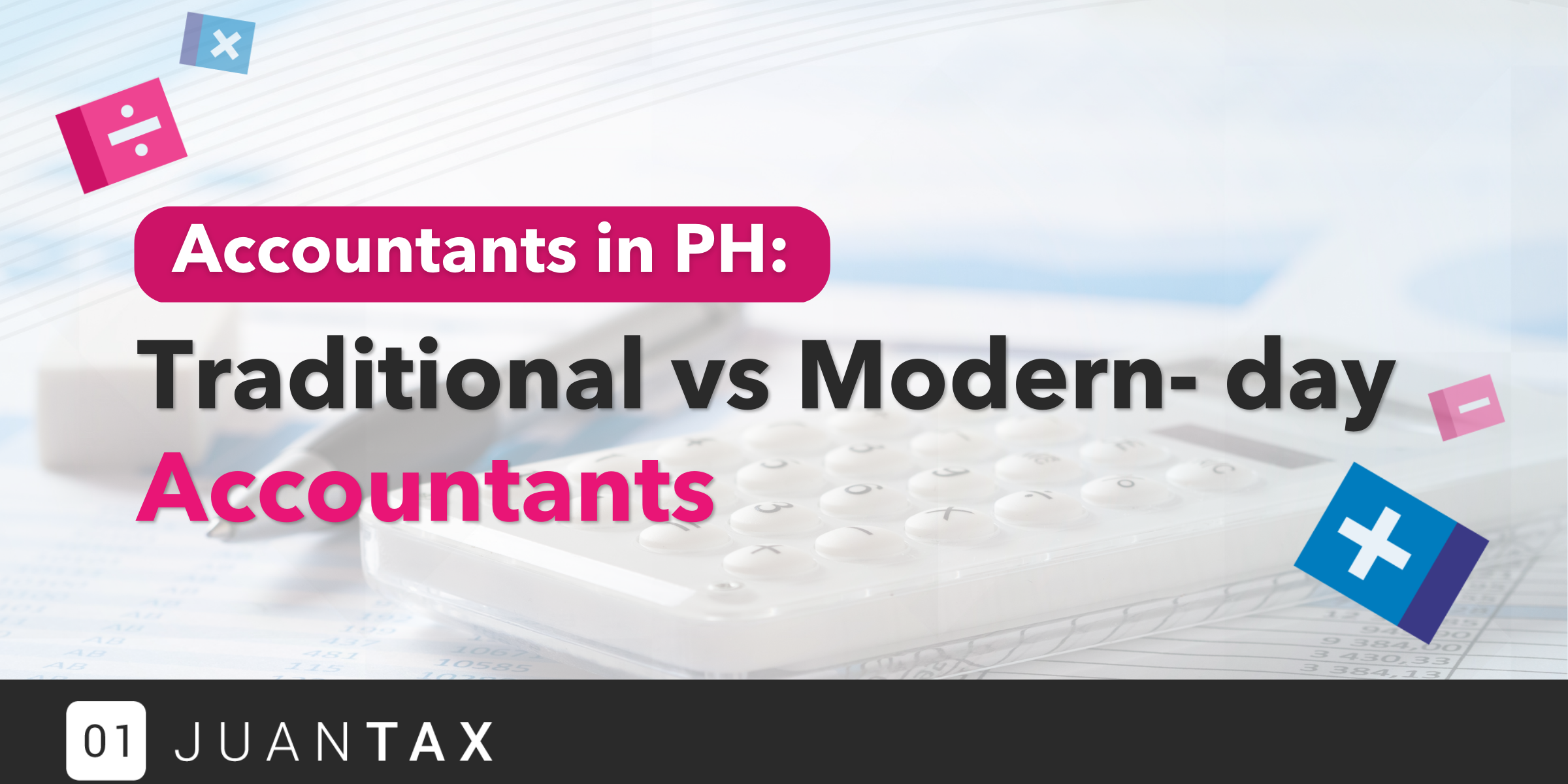Accounting has always been crucial to the operation of organizations, from small start-ups to publicly traded global corporations. Accountants and auditors, they are acutely aware of how crucial it is to continue providing their services to those firms and to their clients. In the Philippines, the role of accountants has evolved over time, from traditional to modern-day accountants
Traditional accountants in the Philippines are typically responsible for finance, bookkeeping and record-keeping, financial management, taxation, budgeting and auditing. They primarily focus on compliance with regulations, accuracy, and reliability of financial information. Also, traditional accounting supports the decision-making of the company by providing accurate financial information from managers to executives. By analyzing financial data, they can make informed decisions about investments, cost-cutting measures, and other strategic initiatives.
On the other hand, modern-day accountants have a broader and more strategic role in business. They still perform traditional accounting functions, but they also provide financial and strategic advice to businesses. Modern-day accountants use technology to automate and streamline processes, analyze data, and generate insights that can help businesses make better decisions.
Overall, the role of accountants in the Philippines has evolved from traditional to modern-day, with a greater focus on strategic business advice, specialized skills, and the use of technology. As the business landscape in the Philippines continues to evolve, so too will the role of accountants in ensuring businesses’ success.

Skills and Competencies of Traditional and Modern- day Accountant
The skills and competencies required for traditional and modern-day accountants can vary based on the type of accounting system used, the industry in which they work, and the specific job requirements. However, there are some general skills and competencies that are important for both traditional and modern-day accountants:
Skills and Competencies of Traditional Accountants:
- Proficiency in bookkeeping and record-keeping: Traditional accountants need to be skilled in basic accounting principles, such as debits and credits, and have a good understanding of bookkeeping and record-keeping.
- Knowledge of tax laws and regulations: Traditional accountants need to be knowledgeable about tax laws and regulations and stay up-to-date with any changes to them.
- Financial analysis: Traditional accountants must have the ability to analyze financial data and interpret financial reports to provide insights and recommendations to management.
- Attention to detail: Traditional accountants need to be detail-oriented and able to spot errors or discrepancies in financial records.
- Communication skills: Traditional accountants need to have good communication skills, as they often need to explain financial information and do consulting to non-financial stakeholders and business advisors.
- Analytical skills: Traditional accountants need to be able to analyze financial data and draw conclusions from it.
Skills and Competencies of Modern-Day Accountants:
- Technological proficiency: Modern-day accountants need to be proficient in using accounting software, data analysis tools, automation, cloud accounting and other technology to perform their work efficiently.
- Strategic thinking: Modern-day accountants need to be able to think strategically and provide insights and recommendations to help organizations make better financial decisions.
- Data analytics: Modern-day accountants need to have the ability to analyze large sets of financial data to identify patterns and trends that can inform business decisions.
- Business acumen: Modern-day accountants need to have a strong understanding of business operations and strategy to provide financial guidance that supports business goals and objectives.
Difference between traditional and modern day accountants
Over the years, the accounting profession has undergone significant changes due to advances in technology, evolving business needs, and changes in regulations. One of the most notable changes is the shift from traditional accounting practices to modern-day accounting methods. In this context, understanding the differences between traditional and modern-day accountants is essential for both aspiring and established professionals in the field.
Aspect | Traditional Accountants | Modern-Day Accountants |
| Technology | Relied on manual calculations and record-keeping | Have access to advanced technology and software |
| Role | Focused on compliance and regulatory reporting | Also expected to provide strategic financial advice and support |
| Education and Training | Followed a more traditional path of earning a degree in accounting, followed by on-the-job training and professional certification | May still follow this path, but there are now alternative routes to entering the profession, such as online courses and specialized training programs |
| Customer Interaction | May have had less interaction with clients or focused solely on financial reporting | Often expected to have excellent communication skills, as they need to be able to explain complex financial information to non-financial stakeholders |
| Flexibility | Often worked regular office hours and were tied to specific locations | Have more flexibility in terms of where and when they work, thanks to the availability of cloud-based technology and remote working arrangements |
Benefits and drawbacks of working with traditional and modern- day accountants
Choosing the right accountant for your business can be a critical decision that can have significant impacts on the success and growth of your company. With the evolution of technology and changes in the business landscape, the role of accountants has also evolved, resulting in traditional and modern-day accounting practices. While each approach has its benefits and drawbacks, it’s essential to understand the differences to make an informed decision that best suits your business needs.

Benefits of working with traditional accountants:
- Personalized service: Traditional accountants often work with smaller businesses and offer more personalized service, building strong relationships with their clients.
- Familiarity with older processes: Traditional accountants are experienced in older processes and may be better equipped to handle specific needs for certain industries or businesses.
- Cost-effective: Traditional accountants may offer more affordable services since they rely less on technology and automation.
Drawbacks of working with traditional accountants:
- Time-consuming: Traditional accounting processes may be time-consuming and may result in slower turnaround times.
- Limited availability: Traditional accountants may have limited availability, as they may not offer online or remote services.
- Limited expertise: Traditional accountants may have limited expertise in modern accounting practices and may not be able to offer more complex services.
Benefits of working with modern-day accountants:
- Improved efficiency: Modern-day accountants use technology and automation to streamline processes, resulting in faster turnaround times and improved accuracy.
- Greater expertise: Modern-day accountants have more extensive knowledge and experience in modern accounting practices, offering a wider range of services.
- Availability: Modern-day accountants often offer online and remote services, making them more accessible to businesses in different locations.
Drawbacks of working with modern-day accountants:
- Lack of Personalization: Modern-day accounting firms may rely heavily on technology, which can make the accounting process more efficient but may also result in a lack of personalization in client interactions.
- Cost: Modern-day accounting firms may charge higher fees due to their access to advanced technology and software.
- Cybersecurity Risks: With modern-day accounting methods often involving cloud-based technology and online communication, there is an increased risk of cybersecurity breaches, which can compromise sensitive financial information.
- Dependence on Technology: Modern-day accounting firms may rely so heavily on technology that they may not have backup systems in place, leaving them vulnerable in the event of a technological malfunction or outage.
- Limited Local Presence: Modern-day accounting firms may not have a physical presence in certain locations, which may limit their ability to provide on-site support or attend in-person meetings.
Overall, understanding the cost-effectiveness, technology, industry expertise, communication, and compliance benefits and drawbacks of both traditional and modern-day accountants can help you choose the right accountant who will provide the most value for your business. By carefully evaluating your options, you can ensure that you have a reliable and knowledgeable accounting partner who will help you achieve your financial goals.
Future of accounting
Accounting is a critical function in any business, including those in the Philippines. As the country continues to grow and develop economically, the demand for accounting services is likely to increase. In particular, with the implementation of the Tax Reform for Acceleration and Inclusion (TRAIN) law in 2018, there has been an increased need for tax compliance services and tax planning advice.
Another trend that could impact the future of accounting in the Philippines is the rise of technology. With the advent of cloud computing, automation, and artificial intelligence, accounting tasks are becoming increasingly automated. This shift towards technology-driven solutions is likely to continue in the future, potentially resulting in the need for accountants to develop new skills and expertise. Additionally, the Philippines has a large and growing outsourcing industry, which includes accounting and finance services. This trend is expected to continue, with the Philippines remaining a popular destination for outsourcing services due to its highly skilled workforce, favorable business climate, and competitive labor costs.
Overall, the future of accounting in the Philippines is likely to be shaped by a combination of factors, including economic growth, technological advancements, and changes in the outsourcing industry. As these trends evolve, it will be essential for accountants in the Philippines to stay up to date with the latest developments and adapt their skills and expertise to meet the changing demands of the market.

Conclusion
JuanTax is the Philippines’ first BIR-accredited tax platform solution that is committed to helping accountants advance their practice using our end-to-end tax platform. Our solution is designed specifically for tax practitioners, with the aim of allowing you to focus on delivering the best client experience.
With JuanTax, you can streamline your tax preparation and filing processes, increase your efficiency, and improve your accuracy, all while providing your clients with superior service.











